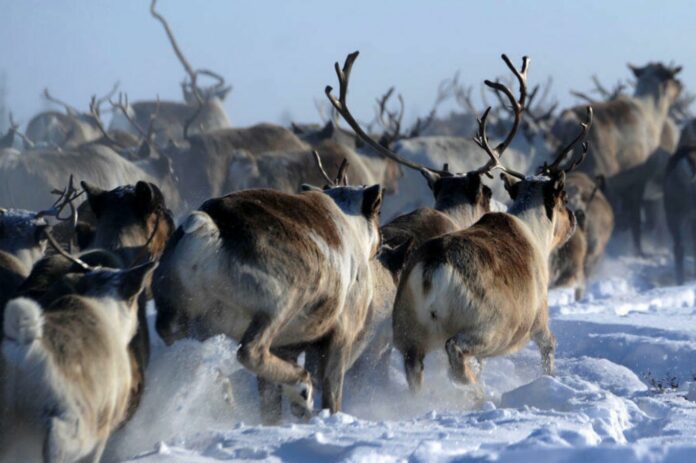Reindeer Fact Sheet: In a study published today in the journal Current Biology, researchers detail a fascinating connection between the time reindeer spend ruminating and their non-rapid eye movement (non-REM) sleep patterns.
EEG measurements found that reindeer brainwaves during rumination match non-REM sleep brainwave patterns, implying that the reindeer are more “rested” after ruminating.
The researchers hypothesize that this multitasking may be helping reindeer sleep during the summer months when food is available and reindeer feed practically constantly in preparation for the lengthy and food-scarce northern winter.
“The more reindeer ruminate, the less additional non-REM sleep they need,” explains first author and neuroscientist Melanie Furrer of the University of Zurich. “We think it’s very important that they are able to save time and cover their sleep and digestive needs at the same time, especially during the summer months.”
In the Arctic, where light-dark cycles vanish during both winter and summer, earlier studies indicated that circadian behavioral rhythms were absent in Arctic-dwelling reindeer during these periods.
However, these reindeer exhibit increased daytime activity during the autumn equinox, summer solstice, and winter solstice when light-dark cycles are present. Until now, the impact of these seasonal variations on the quantity and quality of reindeer sleep remained unknown.
To explore the relationship between seasonal light-dark cycles and reindeer sleep patterns, researchers conducted non-invasive electroencephalography (EEG) on Eurasian tundra reindeer (Rangifer tarandus tarandus) in Tromsø, Norway (69°N).
The study included observations during the autumn, summer, and winter. The adult female reindeer, housed in controlled conditions at UiT The Arctic University of Norway in Tromsø, underwent EEG monitoring in indoor stables equipped with regulated lighting, ample food, and a constant temperature.
They recorded that reindeer slept almost the same amount in the winter, summer, and autumn while being significantly more active in the summer.
In contrast, several animals adjust their sleeping habits in response to environmental factors. Regardless of season, the reindeer spent 5.4 hours each day in non-REM sleep, 0.9 hours in REM sleep, and 2.9 hours ruminating.
“The fact that reindeer sleep the same amount during winter and summer implies that they must have other strategies to cope with limited sleep time during the arctic summer,” adds Furrer.
A potential tactic involves leveraging moments of repose during rumination—a process where partially digested food is re-chewed, integral to the digestive process in reindeer and other ruminants.
Previous observations noted sleep-like brain waves in domestic sheep, goats, cattle, and Lesser mouse-deer during rumination. However, the extent to which rumination might serve a similar restorative function to sleep.
The team discovered that the electroencephalogram (EEG) readings of reindeer during rumination closely mirrored brainwave patterns associated with non-REM sleep.
This resemblance included heightened slow-wave activity and the presence of sleep spindles. Both sleeping and ruminating reindeer exhibited similar behaviors, often quietly sitting or standing, displaying reduced reactivity to disturbances such as neighboring reindeer movements.
Specifically, when awake, reindeer responded to disturbances 45% of the time, compared to 25% while ruminating and merely 5% during non-REM sleep.
To assess whether rumination influenced the reindeer’s sleep drive, the researchers deprived them of sleep for 2 hours and monitored their brainwaves before and after this deprivation.
Following sleep deprivation, the reindeer displayed increased slow-wave activity, indicative of heightened “sleep pressure,” a biological drive for more profound sleep. Intriguingly, when the reindeer engaged in rumination, subsequent sleep showed a decrease in slow-wave activity.
Notably, the more they ruminated, the greater the reduction in slow-wave activity during subsequent sleep.
“This suggests that rumination reduces sleep pressure, which could benefit the reindeer because it means they don’t have to compromise on sleep recovery when they spend more time ruminating,” notes Furrer.
This is particularly crucial during the summer, since the more they consume, the more time they require to ruminate.
“Rumination increases nutrient absorption, so it’s crucial for reindeer to spend enough time ruminating during the summer in order to gain weight in anticipation of winter,” adds Furrer.
Given that reindeer seem to engage in sleep-like behavior during rumination intermittently, subsequent investigations should compare the effects of rumination during sleep with those during wakefulness. Ideally, these studies would also assess reindeer behavior and sleep patterns in more authentic outdoor settings.
They emphasize, however, that such measurements would necessitate surgically implanted EEG sensors, as opposed to the non-invasive surface electrodes utilized in this study.
“Another thing we could add is to look at young reindeer,” says Furrer. “We know sleep need is much higher in young children and babies compared to adults, so it would be interesting to look at sleep in younger reindeer.”
Image Credit: SERGEI GAPON/AFP via Getty Images
